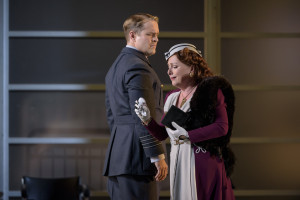There is nothing like a nicely vague concept to get the brain into a twizzle at the start of an opera, particularly when you already know from the publicity photos that the director Harry Fehr and his designer Yannis Thavoris have dragged Handel kicking and not quite shrieking into the mid 20th century.
The idea of placing this 18th century baroque musically charming opera, with a nonsense panto narrative but filled with wondrous singing, into the Second World War is, well, fair enough. The idea of military personnel recovering from battle wounds (in Orlando’s case I assume post-traumatic shock) is a contemporary take on our “hero” being drawn between love and glory and sent doolally by the perfidiousness of his paramour.
How do we hammer home the point that this is a tale of choosing between love and duty? Aha. Edward and Mrs Simpson. Hmm. Well maybe. Brain twizzle time.
Unfortunately having Edward inspecting a line-up of Nazi soldiers and then swastikas swirling around in the copious amounts of video projections did rather suggest that was what had caused the war. Maybe the director thinks it did. Judging from overheard interval chat I am sure plenty of the audience didn’t even notice the references. Whether the aversion therapy slide show failed to work (we got a shot of Edward on horseback and then Mrs Simpson but that was all as the rest was blank screen) I do not know. Maybe Orlando was supposed to be Edward and was being shocked into his senses to ditch the American divorcee. Maybe I think too much. I shall stick my finger in a plug socket.
Anyway, this all allows for the concept to be followed through with cool 1940s costumes and hairstyles which I am sure was huge fun for the cast and, while this is a Scottish Opera buy-in (ie a new production to Wales), it still probably helped soak up some of WNO’s relatively-speaking generous budget while giving us something to look at in what will never be an opera that offers the greatest theatrical engagement. It is pleasant enough but doesn’t have the sparkle of other Handel masterpieces that other opera houses have been staging with delightful results.
Lawrence Zazzo and Rebecca Evans
Nicola Morgan, Lawrence Zazzo and Helen Greenaway
I wouldn’t spend too much time working out the plot of this descent into and out of madness although it is a credit to the team that it is easier to follow on stage than in any synopsis you will ever read. You just need to know Orlando loves Angelica, Angelica loves Medoro, Dorinda also loves Medoro. Orlando finds out about Angelica and Medoro and loses his marbles (okay, so he is already in hospital anyway but let’s ignore that).
Therefore, Orlando is in the care (some might say experimental hands) of psychiatrist Zoroastro sung by baritone Daniel Grice and the rising star Fflur Wyn’s gloriously engaging Dorinda is a nurse. Thus we have intense duets delivered over tea trolleys as she hands out cups of char and measures the lunatics’ medicine from this time the drugs trolley. Rebecca Evans is presented as a rather glam 40s beauty with a hint of female rivalry adding an edge to her more poised and empathetic role of Angelica. I have no hesitation in saying Fflur and Rebecca gave the most technically and emotionally enjoyable and elegant singing of the performance. We all wait for “Verdi piante” and in Rebecca’s hands we were not to be disappointed.
Ben Tinniswood, Lawrence Zazzo and Jack O’Kelly
What can you say about the men cast as war heroes singing roles created for classically attired castrati? In a season dubbed Madness (yeah, okay) the vocal and dramatic portrayal of losing his mind by Lawrence Zazzo was first-rate and quite chilling. He was utterly convincing when he lost his senses, dropping his pyjama pants and thankfully going no further, hurling his tea across his hospital cell and hiding under the bed as he had delusional fantasies. Even more chilling was the madness of those quack doctors experimenting on him and administering electric shock treatment which, sadly, it seems to have been suggested did the trick. Quite why the doctors seem to have let him set fire to the hospital as part of the treatment is beyond me – but then I am thinking again. I hope there weren’t any NHS doctors in the house and if so they are kept well away from any mental health clinics.
Dramatically there isn’t a lot Robin Blaze can do with the dull as a hospital waiting room part of Medoro who for some obscure reason (but then it is all pretty obscure) has won the affection of both Dorinda and Angelica. He is of secure, rich voice and limps along quite convincingly and joins the rest of the cast in effortlessly manoeuvring through the doors of the revolving set. At the end it is all tickety-boo, except poor nurse Dorinda is left on her own. I would have ended the opera with Dorinda and Angelica eloping, leaving Orlando and Medoro to enjoy dressing up in their jolly uniforms and head off into the sunset together. Maybe they should all of just had a nice cup of tea from Dorinda’s trolley and raised a toast to the king (George VI of course).
Ben Tinniswood and Lawrence Zazzo
Anyway, we all came for Handel’s music and the singing so let’s throw cognitive analysis aside and go mad for that (okay, so gently entertained) and although this opera isn’t the cherry on the Handel cake we still an afternoon of delights from the orchestra vigorously conducted by Rinaldo Alessandrini.
Further performances of Orlando at Wales Millennium Centre October 3 and 7 October, then on tour including one other performance in Wales, at Llandudno’s Venue Cymru on October 28.



